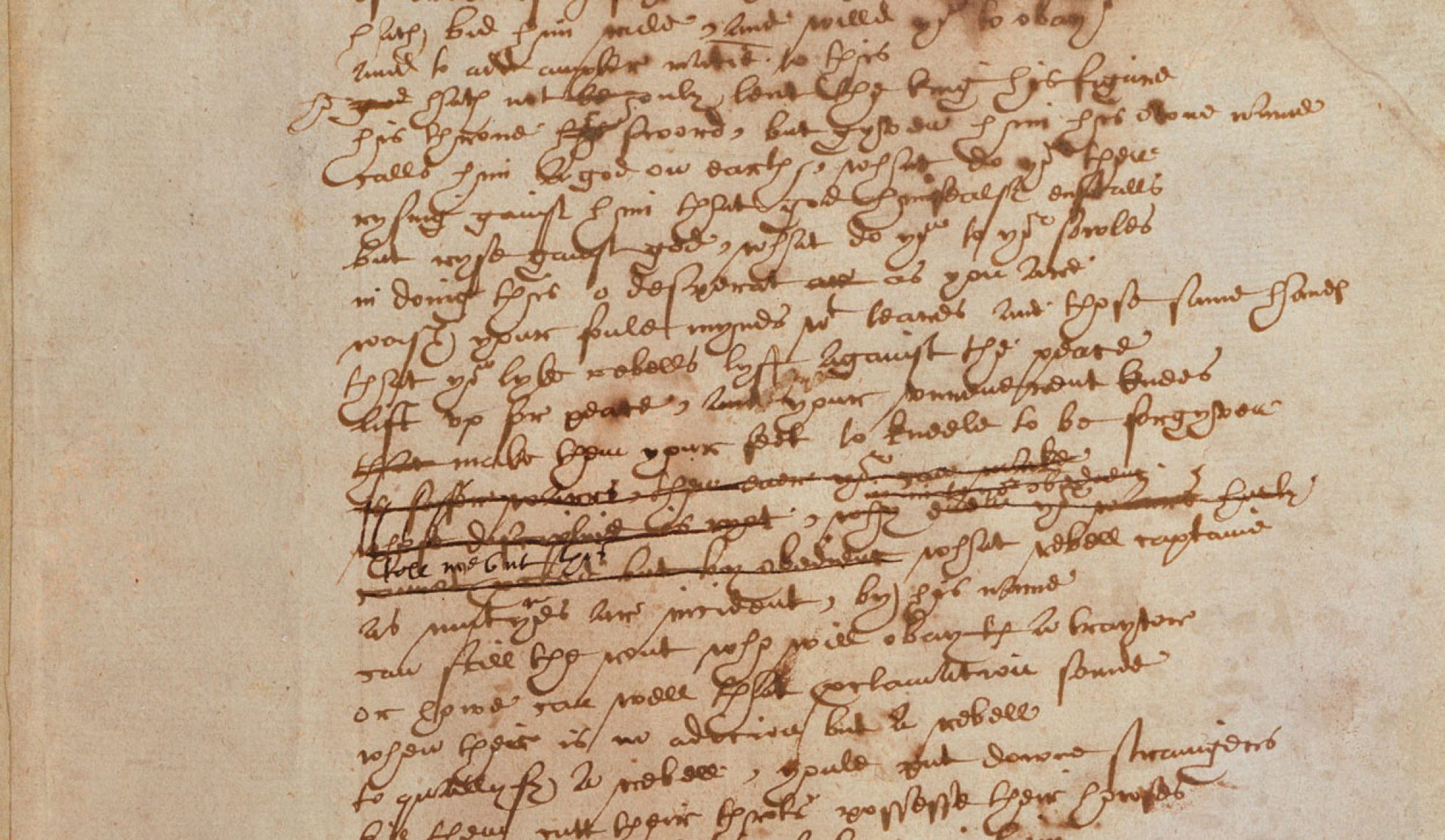This course takes a survey of the playwright’s linguistic resources over fifteen years of his career, from A Comedy of Errors to The Winter’s Tale. We will consider, on the one hand, the influence on his writing (and the usefulness for us) of the techniques and vocabularies of grammar, rhetoric, and prosody. On the other, we will reckon with his powers of figuration, how he makes his metaphors out of the words his culture gave him. A third hand will be useful for problems of how the language adapts to dramatic situations and shapes character. We may need a fourth, now and again, to manage comparison with the language of his sources and of contemporary dramatists. It is a good thing we will be a seminar.
Each class will take up a single play (with two weeks for Hamlet) in view of a specific set of linguistic questions, and supplementary readings will be assigned to guide and inform our discussions. Three members of the seminar will propose loci for attention in the play each week, on a rotating basis. There will be no final essay; instead, there will be weekly exercises in imitation: emendations, expansions, or interventions into the plays that will track our sense of the evolution of Shakespeare’s style. A page of prose commentary will accompany each, and some share of class time each week will be devoted to workshopping the results. The basic project of the seminar is to learn to describe Shakespeare’s language resourcefully and accurately, to see and hear it better, and to remake it for ourselves. If we are moved to try to explain what we perceive, or even interpret it, so much the better, but we will experiment with understanding interpretation as a tool of attention, rather than the other way around. The techniques of analysis we learn and the theoretical questions we confront should be of use in a wide variety of contexts beyond our author and his period. Shakespeare is generally outward-looking and we can hope to be, too.
Readings will be set for the first nine weeks, according to the topics below; details and supplementary texts will be available week by week on the class blog (see below). The last three weeks of term, our plays will be King Lear, Antony and Cleopatra, and The Winter’s Tale; the syllabus is otherwise open to accommodate emergent questions and procedures. Any scholarly, well-annotated edition of the plays is acceptable. I recommend the Oxford editions, which are available at Labyrinth (along with the Arden Lear). The only other required book is Richard Lanham’s A Handlist of Rhetorical Terms, also available at Labyrinth. Supplementary readings for each week will be posted on our blog.
Some technicalities:
Passages for emphasis: Each week, three students will be responsible for identifying a passage for the class to consider, and emailing us by noon on Tuesday to tell us what it is. In your weeks, it will be your job to introduce the passage and to ask a few questions about it—offering and opening it to the class. Any background research you might to do into features of the language that catch your eye will be welcome. A few minutes should suffice; your aim is to provoke discussion, not predetermine or foreclose it. You might choose something singular, or something interestingly typical. Pay some attention to the thematic emphases of the given week.
Blog: We have a blog for the class at https://commons.princeton.edu/shakespeares-language/. Assignments and exercises will be found there. Each week, after our meeting, I will post a digest of my impressions from the seminar; I encourage you to comment, as a way of continuing our discussion. Please also consider posting any relevant thoughts or observations (a passage of particular interest, a finding about e.g. the relative frequency of proverbs in different plays that your discovered, a new digital tool, etc. etc.). We will together curate a set of categories that will help us sort through what I hope will be a burgeoning resource.
Exercises: The course has weekly exercises, rather than a final paper; they will be handed out in class each week for the week following. Most will consist of specific protocols for imitation, beginning with local transformations of Shakespeare’s language, advancing to more ambitious impersonations (though we will be allowed some dissatisfaction with that word). Typically I will ask for six to ten lines of verse. Each exercise should also be accompanied by a prose commentary of roughly five hundred words, explaining what you have done in terms that draw on the class’s expanding technical repertory. Three members of the class each week will submit their exercises for workshopping, in the manner of a creative writing class. (Which this is, inter alia.)
Schedule of Readings
Week 1 (Sept. 13)
Comedy of Errors
Readings on meter
Week 2 (Sept. 20)
Love’s Labors Lost
Readings on rhetoric (invention and the levels of style)
Week 3 (Sept. 27)
Richard II
Readings on figuration
Week 4 (Oct. 4)
Midsummer Night’s Dream
Readings on stylistic analysis and stylometrics
Week 5 (Oct. 11)
Henry IV Part 1
Readings on character
Week 6 (Oct. 18)
Hamlet
Readings in the history of the language (words)
Week 7 (Oct. 25)
Hamlet
Readings in the history of the language (syntax)
Week 8 (Nov. 8)
Othello
Readings in music and sound
Week 9 (Nov. 15)
Measure for Measure
Readings in discourses and discourse theory (especially law)
Week 10 (Nov. 29)
King Lear
Week 11 (Dec. 6)
Antony and Cleopatra
Week 12 (Dec. 13)
The Winter’s Tale
